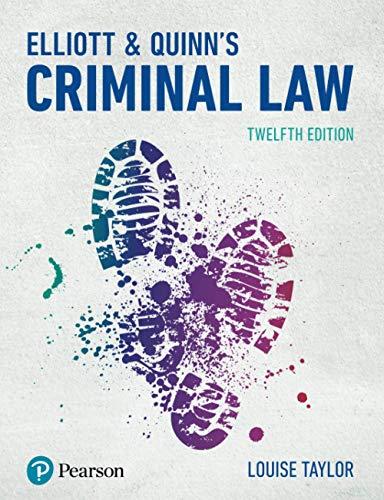Question
Instructions: Step One: Locate the syllogisms in the following excerpts from three famous United States Supreme Court decisions. The Background Excerpt is only
Instructions:
Step One: Locate the syllogisms in the following excerpts from three famous United States Supreme Court decisions. The "Background Excerpt" is only to aid in your general understanding of the case. To identify the syllogism in each case, focus only on the "Excerpt from the Court's Decision.
Step Two: Put each of the syllogisms into standard form: State the major premise, the minor premise, and the conclusion. Note: They may not appear in the appropriate order in the decision. Fill in the missing premise or conclusion if it is an enthymeme.
Griswold v. Connecticut
381 U.S. 479 (1965)
Background: A Connecticut statute made it a crime to use any drug, medicinal article or instrument to prevent conception and that any person who assists, abets, counsels or causes another to commit any offense may be prosecuted as if he were the offender. Defendant was convicted for giving medical advice to married persons and prescribing contraceptive devices. On appeal, the Court declared the statute unconstitutional.
Excerpt from the Court's Decision:Various guarantees creates zones of privacy. The right of association contained in the penumbra of the First Amendment is one. The Third Amendment in its prohibition against the quartering of soldiers "in any house" in time of peace without the consent of the owner is another facet of that privacy. The Fourth Amendment explicitly affirms the "right of the people to be secure in their persons, houses, papers, and effects, against unreasonable searches and seizures." The Fifth Amendment in its Self-incrimination Clause enables the citizens to create zone of privacy which government may not force him to surrender to his detriment. The Ninth Amendment provides: "The enumeration of the Constitution, of certain rights, shall not be construed to deny or disparage others retained by the people."
The present case, then, concerns a relationship lying within the zone of privacy created by several fundamental constitutional guarantees. And it concerns a law, which, in forbidding the useof contraceptives rather than regulating their manufacture or sale, seeks to achieve its goals by means of having a maximum destruction impact upon that relationship.
Syllogism:
Major Premise:
Minor Premise:
Conclusion:
Step by Step Solution
There are 3 Steps involved in it
Step: 1

Get Instant Access to Expert-Tailored Solutions
See step-by-step solutions with expert insights and AI powered tools for academic success
Step: 2

Step: 3

Ace Your Homework with AI
Get the answers you need in no time with our AI-driven, step-by-step assistance
Get Started


